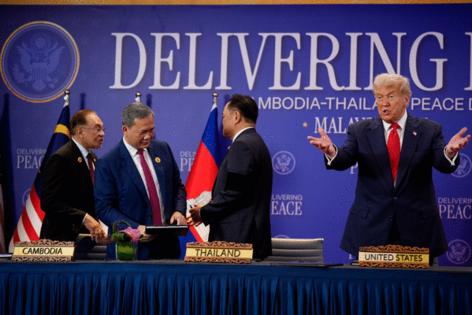Thailand spurns Cambodia peace deal tied to US trade talks
Published in News & Features
Thailand has suspended a peace process with Cambodia that was a condition for tariff negotiations with U.S. President Donald Trump, after Thai soldiers were injured in a land-mine blast near the border.
The suspension will remain in place until the Thai armed forces deem “hostilities” have ceased, Prime Minister Anutin Charnvirakul told reporters after a meeting of the National Security Council on Tuesday. Later in the evening, the prime minister traveled to Si Sa Ket province to visit four soldiers injured earlier this week by what the Thai army said were newly laid mines.
Anutin was visibly emotional as he spoke to the wounded soldiers at their bedside, one of whom had lost an ankle in the blast.
“The agreement to pave the way for peace is over for Thailand,” he told reporters during the visit to the border province. “It’s clear that we will no longer be implementing the terms, and we will determine our own process. The government will fully support the armed forces’ terms and operations.”
Anutin’s move underscores how domestic political sensitivities about the border dispute outweigh economic and diplomatic considerations, at least for now. The blast reignited nationalist anger, leaving the Thai leader little room to appear soft on Cambodia, even at the risk of jeopardizing his country’s trade deal with the U.S.
The Thai government may consider revoking the peace deal altogether unless Cambodia responds to Thailand’s formal protest, according to spokesman Siripong Angkasakulkiat. Anutin has instructed the defense ministry to step up military operations to protect Thailand’s sovereignty and secure the border, Siripong said.
“All terms in the joint declaration will be suspended, and the plan to release Cambodian detainees will be terminated,” Defense Minister Nattaphon Narkphanit said earlier on Tuesday, referring to 18 soldiers being held by Thailand.
The blast was the seventh such incident in four months, following a wave of explosions in July that sparked the deadliest border clashes in years before Trump’s intervention.
The U.S. president had earlier threatened to scupper trade deals with both countries unless they halted fighting, and Thai officials have said holding a peace-summit style meeting during his Asia trip last month was a condition for agreeing to trade terms.
Anutin later referenced the peace deal when he made a direct plea to Trump last month for a “better” trade deal.
The so-called Kuala Lumpur Peace Accords outlined the removal of heavy weapons from border zones between Nov. 1 and Dec. 31 and a cooperation on land-mine clearances as part of efforts to normalize ties. Thailand also sought Cambodian crackdowns on cyber-scam operations there.
The peace deal had been struck only to placate Trump, who could still use tariffs as a lever to try to get it back on track, said Matthew Wheeler, senior analyst for Southeast Asia at International Crisis Group. But that may be challenging due to political sensitivities in Thailand.
“Thailand’s suspension of implementation reflects just how febrile is popular sentiment on the Cambodian border issue, and how little political space there is for the government to pursue a conciliatory approach,” Wheeler said.
Cambodia’s defense ministry denied the mines were newly laid, adding that they likely were remnants of past conflicts that have not been cleared. The country “remains committed to working closely with Thailand to promote peace and stability” under the Trump-backed peace declaration, a defense ministry spokeswoman said in a statement on Tuesday.
A joint statement on the U.S.-Thai trade deal last month outlined some preliminary agreements including Thailand’s elimination of tariff barriers on about 99% of U.S. goods, especially industrial, food, and agricultural products. In return, the U.S. will impose 19% tariffs on Thailand, with some products that are yet to be identified set to be tariff-free.
Thai authorities said that the framework is non-binding and detailed talks will follow, with the aim of concluding negotiations by the end of the year.
©2025 Bloomberg L.P. Visit bloomberg.com. Distributed by Tribune Content Agency, LLC.







Comments